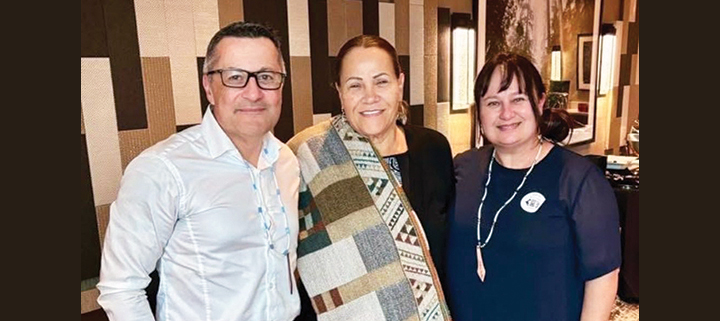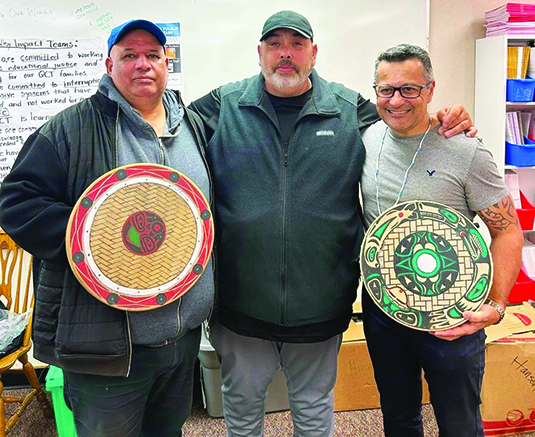
Submitted by Dr. Stephanie A Fryberg
You may have seen a couple of resolutions about the Tulalip Academy of Excellence in the last board meeting. First, we’re excited to announce that we hired a consultant who specializes in fundraising. Building and operating a school is expensive. Our consultant has experience fundraising for both big building projects and for the ongoing operations of our schools. She will also help us set up a data tracking and grant management system to ensure we can continue to bring in funding in the future.
There was also an update to the Higher Education Policy adding the University of Te Whare Ranga Wananga o Awanularangi for a bachelor’s degree and teaching certification in education. If we strive for a school that amplifies student success and enhances child wellbeing, we have to completely re-write the playbook for education and that’s why we’re partnering with an internationally certified Māori Indigenous teacher certification program.
Western Education has not served our people (or any other group of people) well and revising the existing system has not worked. We need our teachers to be innovative and to have teaching and behavior management strategies that work for our children; we need to do things completely different.
Tulalip has partnered with a renowned Indigenous teacher training program in New Zealand to grow our own teachers. The program provides extensive knowledge about how children learn, what aspects make a great teacher, child developmental stages, planning, assessing and preparing for fun, engaging and challenging lessons. Future teachers are also steeped in knowledge about styles of learning and how being culturally responsive helps to enhance student engagement.
Kamiakin Craig one of the program’s first students said, “This program means that I can further provide more in my current job position and I can also serve my community in a broader way. Auntie Linda’s (Dr. Linda Tuhiwai Smith, distinguished professor at Te Whare Wānanga o Awanuiārangi) teachings stick with me in my day-to-day job and I recognize things that need to change for our people. This class has changed the way I interact with adults and children at school, I am forever changed as I am aware of not perpetuating colonial structures. Through this class I have been encouraged to continue to be who I am outside of school, to be a good relative to my students.”
By the end of the program, our tribal members will understand the art and science of teaching. This holistic—traditional learning approach to teaching—will help us be successful in the future and will ensure that our children have every educational opportunity available to them in the future.

University President
Tribal member, Julliana Jones, another one of our students, said, “I have learned more from this short time in class than I have in my entire educational experience. We’ve learned so many things in this class that I would never have learned going to any other school. One of the things I’ve learned that has shifted my thinking while taking this class has been simply the ways we can work on decolonizing our minds and communities. I see this class as more of a movement or step in the right direction for Tulalip to regain our language and ways of life starting with the younger generations and working our way up.”
In the end, we want teachers who bring out the best in our children because they’ve connected with our children’s hearts and minds. Our teachers will be ready to teach in a way that engages students and uses indigenous-centered ways of being; teaching through the lens of our culture and identity. Our Tulalip Tribal member, Dr. Chelsea Craig, has shown tremendous leadership in championing this program. She has recruited a full cohort of teachers in training and, thanks to the efforts of our program recruiter and mentor, Tina Brown, we have seven tribal members on our wait list to start the next round. Our teachers-in-training are from Tulalip, Yakama, Makah, Alaska Native, and one is from South America.
“This program will change the way our students learn in a better way,” explained another Tulalip student Neah Napeahi. “One thing I like about the program is that I am learning more about different teaching methods that directly combat colonization. We are learning lots of important tools that will help us shift the narrative for our people. We are used of seeing one way of schooling and our kids are going to have different experiences in schools than we did, they will have a space where they fully belong and where they can be their whole self.”
We are recruiting teachers and sending them to learn together in cohorts because we want our teachers to be able to support each other and reinforce these ways of teaching. Once a year, the cohorts will travel to New Zealand for supervision and a cultural institute. Our teachers will have the tools to teach our children reading, writing, and math using traditional knowledge as their foundation.
For Tribal student Shelbi Hatch, this is a stepping stone towards more than just a livelihood, it’s her calling. “To me this program is one of the final steps. I have realized this is a career I am passionate about. I find joy in what I am learning about, and I find my mindset being shifted which is something I have never experienced in college. One thing I have learned that has shifted how I think about being a teacher is understanding thoroughly the tactics colonialism and Imperialism has had in education at a detriment of our people.”
Taking back how we raise and teach our children is sovereignty in action. If you are interested in learning more you can reach out to Chelsea Cheslea_Craig@msvl.k12.wa.us, or Justina “Tina” Brown at Jubrown@tulaliptribes-nsn.gov. Tina’s role is to support our tribal members going through the teacher certification program. She can walk you through financial aid, how to navigate the system, and where to get materials. No matter where you are in your own education and life journey, you can have a place in our school. Please reach out to learn more.